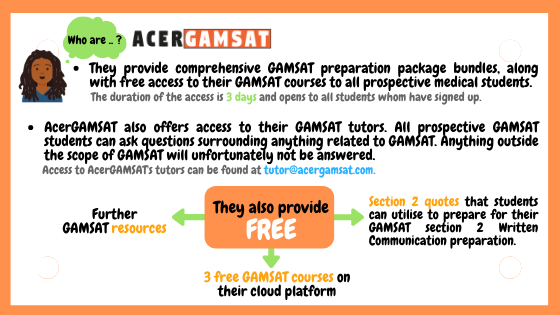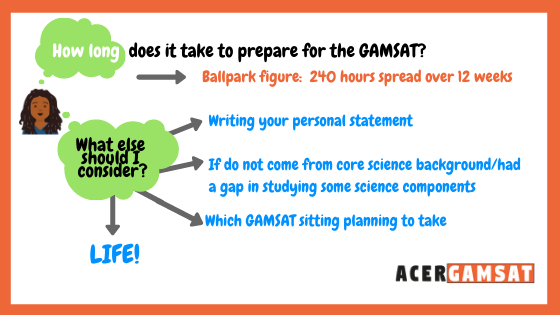Graduates – let’s talk about GAMSAT!
20 Medi 2020
As part of my preparing for your medicine application series, I am delighted to be able to provide some information about GAMSAT for those of you who are looking to do graduate entry medicine or wanting to find out some information as an alternative pathway into medicine. As a disclaimer, as I mentioned in the overview, I have not completed this exam myself so I am no expert, but luckily AcerGAMSAT stepped into collaborate with providing some great advice and information for me to communicate with you all! They also provide some blogs as well which you can check out here!


Before we get into the nitty gritty details about GAMSAT, let’s quickly take a throwback to my one of my first blogs on choosing medical schools. Do you remember this map? Currently, there are 33 medical schools in the UK. At the time of this blog, 8 of these require the GAMSAT (this data is taken from the official GAMSAT provider website so keep on referring to this website for any changes) – one of these being Cardiff – hence the need for this blog!
Hopefully by the end of this blog, you will have a short insight of GAMSAT, but this time instead of messaging me on Unibuddy for any further follow up (as I am no expert!), it’s worth mentioning that you can utilise AcerGAMSAT’s free service for any advice or issues you might be having. It can be anything from further preparation support or other issues such as figuring out how to balance your work life with studying for the GAMSAT.

So what is GAMSAT actually about?
GAMSAT stands for Graduate Medical School Admission Test! Its purpose is “to assess the ability to understand and analyse written and graphically presented material”, to think critically about issues and, in the case of the Written Communication section, to organise and express thoughts in a logical and effective way”. This definition is taken from the official GAMSAT information booklet September 2020 which I cannot stress and recommend to read THOROUGHLY – this blog is a great supplement to this advice from the providers themselves!
How is the GAMSAT structured?
In case you didn’t know already, the GAMSAT assesses your performance in the following three areas:
1) Reasoning in Humanities and Social Sciences
2) Written Communication
3) Reasoning in Biological and Physical Sciences
Since problem-based learning techniques are central to modern medical curricula, GAMSAT is constructed with a major focus on the assessment of problem solving ability across a wide range of subject areas. Unlike its American counterpart (MCAT), the GAMSAT does not test your memorisation of content.
However, it is important mentioning that you will not ace the GAMSAT if you do not study for it. Many students unfortunately fall into the trap of thinking that the GAMSAT does not test memory and thus go into the GAMSAT hoping to wing it. There isn’t an exam in the world where you can go in prepared without putting in revision hours!
How has the test been adjusted for COVID-19?
Prior to COVID-19, the GAMSAT which was delivered as a paper based test but now it will be delivered as a digital test in 2020 due to the COVID -19 pandemic and the required social distancing restrictions that are in place at a test centre location through a provided device.
Note that this has changed from the May 2020 setting which was completed from home with remote proctoring through ProctorU. This has led to some differences in structure and format between the May and September 2020 exam compared to previous, in-person sittings. Nevertheless, the new digital formats of the GAMSAT exam still require the same fundamental preparation as they are essentially designed to test the same skills and the results are standardised to be comparable across all sittings.
It appears that it is more reassuring taking it from a test centre location, to ensure strong internet connections, easier moderating and preventing any unwarranted scenarios shuttting down the test which some students faced in May. Hopefully any students retaking it this September have extra comfort from this as well.
For further details and the most up-to-date information it’s highly advisable that students visit the official GAMSAT website – I linked their information booklet earlier in the blog as well!
Hold up, so is there two sittings of the GAMSAT that I can do?
Yes so each year the GAMSAT can either be taken in March (this year was in May) or September. There is no penalty or different weighting applied to a September GAMSAT Exam score on medical school entry applications.
Many students view the September GAMSAT exam as a second chance to obtain a satisfactory result for the next calendar year without having to wait a whole year in between attempts and there are certain advantages to this:
- For example, it provides you with extra time to consolidate further on the preparation put into the March/May GAMSAT exam.
- It allows you to make a second attempt on the actual exam in the same year with the benefit and experience of having already sat the GAMSAT Exam.
- Many students ultimately undertake the GAMSAT first time around as a trial run, so that they can work on certain weaknesses that they may have, before they sit the exam ‘properly’ in the March 2021 of the next year.
So how can you prepare?
Firstly, let’s tackle exam preparation timelines. It is essential that you sit down and have a rough plan of some revision targets for each week to maximise your learning. But when do you actually start preparing and how long will it take? Honestly, this answer may not be satisfying, but it depends!
But to put you out of your misery, AcerGAMSAT have recommended a ballpark figure:

However, it is important to appreciate that not all GAMSAT students are the same and actually anything over 12 weeks is recommended due to a number of reasons highlighted in the graphic:
- If doing September sitting, don’t forget you need to be drafting your personal statement for your UCAS application to be sent before 15 October deadline. I’ve done some advice about starting it here!
- Although GAMSAT is not a science knowledge test, it does require a strong grasp of core science topics so you will need to devote a lot more time to review content if this is completely new or has been a while science studying them!
- If you’re planning on taking a March sitting, then actually you would need to have started preparation in November/ December of the previous year (e.g. for March 2021 – start in Dec 2020)
- It is perfectly healthy and normal to have a life outside of GAMSAT preparation. You may have different responsibilities and heavier commitments to juggle so in this case you should ideally think about revising for the GAMSAT 6 months or more prior to the GAMSAT exam to allow for sufficient prep!
Saying that there is indeed a caveat to elongating your GAMSAT studies. The longer you space out your GAMSAT revision, the more risk you have of burning out, being bored, or having the GAMSAT completely take over your life, which 10/10 would not recommend!
I love this quote from this great blog (interestingly titled “I think I’m too dumb for the GAMSAT”): “Do not think of GAMSAT studying as a chore, but as a chance to learn new things“. Yes it is hard work and efforts required but you have to look on the bright side of the knowledge you’ll be getting out of it in the end!
Next, let’s consider resources to use! If you’re one who likes to be held accountable for your work schedule, you could always consider doing a preparation course, which have shown results in helping students become efficient in their studies. There are a number of these available. However, another disclaimer many of these do come at a cost – and as an advocate for free or bargain priced services, I recommend trying out what you can get for cheap before committing your money to premium services, as the test itself is already expensive as it is (whopping £265 in the UK!).
Luckily, some of the premium services, like which AcerGAMSAT provides in addition to their free services, come with a 60 day money-back guarantee so you can always try it risk-free for 60 days, which is useful to know!
Other resources to consider are: books, websites, Youtube channels – which to save me doing the work, these are already usefully listed by AcerGAMSAT in this – check them out here! This also contains links to further breakdown of each section, top tips and guidance!
I am incredibly grateful for their support in helping to provide content to this series! It’s worth mentioning some other sites for you to check out as well (again to reiterate I haven’t tried these myself but collating some from my research!):
- Medic Portal: provide a great graduate entry medicine application guide – including information about interviews as well
- The Medic Blog: a great site with a variety of content- to pick out a few, they have an interesting 30-day GAMSAT challenge series. Theyve also done an interesting blog on alternatives to Khan Academy GAMSAT resources
- Gamsat-prep.com: do a range of free content in addition to premium content including live monthly webinars – have linked their free resources page here!

I hope this blog has been useful! Check out all the links which will lead you to advice from trusted providers! If you have other questions surrounding medicine or even life at Cardiff, please don’t hesitate to get in touch with me via UniBuddy!
Go back to the overview blog to see links to the rest of the application series including personal statement advice, UCAT and work experience from home!
- Advice for Students
- After University
- Ail flwyddyn
- Application Process
- Application Process
- Applying to University
- Arian
- Aros gartref
- Astudio
- Byw oddi cartref
- Cardiff University Experiences
- Chwaraeon
- Clearing
- Clybiau a chymdeithasau
- Cooking
- Cyd-letywyr
- Cymraeg
- Darlithoedd
- Dim ond yng Nghaerdydd
- Exams
- Global Opportunities
- Guest posts
- Heb ei gategoreiddio
- Medic Tips
- Mynd allan
- Neuaddau Preswyl
- Open Day
- Opportunities
- Postgraduate Study
- Rhentu tŷ
- Student Heroes
- Student Life
- Studying Online
- Swyddi a phrofiad gwaith
- Teithio
- Things to do in Cardiff
- Top Tips
- Trydedd flwyddyn
- UCAS Application
- Why University?
- Ymgartrefu